FUTURE MUSIC (Issue 95) · Article
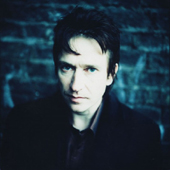
FUTURE MUSIC
Issue 95
May 2000
RECOIL RETURNS
Alan Wilder shaped the sound of DEPECHE MODE for over a decade, and now his RECOIL output is redefining the meaning of the phrase 'solo project'.
Mark Ramshaw discusses the fine art of collaboration with the man himself...
AMBITION, NOT MONEY, is what really drives the music industry. But what happens when you fulfil all those ambitions? What do you do when your band is known the world over, having dominated the charts, sold millions of albums and left an indelible mark on the face of modern music?
If your name is Alan Wilder and that band is DEPECHE MODE, the answer is to jack the fame game in, and become one of the rare breed of musicians for whom the adage 'I love it, and if anybody else likes it, it's a bonus' really goes ring true.
"I'm certainly in a privileged position", concurs the man himself. "I realise there aren't that many people around who can do that. I don't need to worry about the financial returns, so I can do things my way and still survive quite comfortably."
Architect of immortality
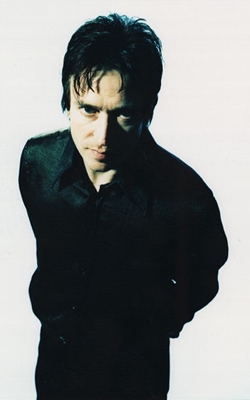 As a member of DEPECHE MODE, Wilder was known for his talents as a chief architect of the band's sound. Now working as RECOIL, he continues to excel in this role, acting as ringleader on a series of albums rich with collaborations. "I'm not a natural songwriter," he says. "I've come to realise that where my strength lies is a catalyst, orchestrating the music."
As a member of DEPECHE MODE, Wilder was known for his talents as a chief architect of the band's sound. Now working as RECOIL, he continues to excel in this role, acting as ringleader on a series of albums rich with collaborations. "I'm not a natural songwriter," he says. "I've come to realise that where my strength lies is a catalyst, orchestrating the music."
The new album is LIQUID, an appropriate name given RECOIL's lack of solid structure. Over the course of the last three albums, such diverse artists as Moby, CURVE's Toni Halliday and Douglas McCarthy of NITZER EBB have cropped up, and now this latest wipes the state clean again, featuring collaborations with a whole new set of artists and musicians.
"There wasn't any great intension with the album apart from wanting it to be different from the last one," explains Wilder. "That meant starting with different singers. Choosing who to work with is difficult at the beginning. The music has to come first for me. Once I have a framework or atmosphere in place, then that tends to suggest something to me."
Sound working methods
The reason RECOIL is such an unpredictable entity is clearly down to the collaborations. It's the way Alan builds his songs around the input of the guest artists. He comes up with the initial ideas, then feeds off the performance of the collaborator to further build on the track, working instinctively rather than to any grand design.
"With DEPECHE MODE," Wilder begins, "our songs were always prewritten - the structure and words - and we'd enhance that and try to take it further. With RECOIL it's completely the other way round. One of the reasons I left the band was to have a lot more freedom in that respect, to take the pressure off and have something more open-ended."
RECOIL is notably more adventurous, less radio-friendly than DEPECHE MODE though. Alan opines that music always needs to be written for personal rather than commercial reasons: "You just can't predict what will be popular. Even with DEPECHE MODE we couldn't. Whenever we thought we had a surefire hit we were always proved wrong."
The choice of the first single from LIQUID bears out his statement. The obvious commercial track is JEZEBEL, but Alan decided that brooding STRANGE HOURS was a far better representation of the album's sound.
People friendly
To the outsider it seems the desire to work with an ever changing roster of vocalists and musicians is a reaction to the limitations of the band dynamic. "It's partly that but it's something we never gave ourselves much of a chance to do in the group." Wilder argues. "I feel music requires a lot of different voices and now I've got the perfect opportunity to do that."
Alan also admits it provides a healthy contrast to the isolation of working solo. "It's important to me because I'm working alone a lot of time. To work with people who'll push me and whom I will push creates an added tension that's good for me. One of the problems with working on your own is losing your sense of perspective. If you bring someone new in, you find yourself hearing through their ears, which is always a good thing."
When deciding who to work with Alan takes an instinctive approach, choosing people most appropriate for each track. "My process of integrating what they do is very much my part of the collaboration. We discuss in advance, so we each know what we're doing, and give each other freedom within that. For example, STRANGE HOURS developed this dark blues dub feel which immediately brought to mind Diamanda Galás. It's about following the music, allowing it to dictate what is right and then finding the right people to enhance what's already there."
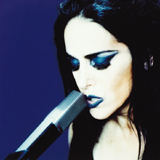 Galás is a singer, musician and artist renowned as much for her uncompromising personality as her experimental work and four-octave range. That unearthly voice is used to stunning effect on the track, as she growls out a dark tale of love, betrayal and guilt in a primal Southern growl. "She's a larger-than-life character," acknowledges Alan. "But she's also great fun. She's got a strong personality, but she's very intelligent and so doesn't try to overpower you. If she feels she's being understood then she's very open. That also applies to her music, and so I found she was always easy to work with; very professional."
Galás is a singer, musician and artist renowned as much for her uncompromising personality as her experimental work and four-octave range. That unearthly voice is used to stunning effect on the track, as she growls out a dark tale of love, betrayal and guilt in a primal Southern growl. "She's a larger-than-life character," acknowledges Alan. "But she's also great fun. She's got a strong personality, but she's very intelligent and so doesn't try to overpower you. If she feels she's being understood then she's very open. That also applies to her music, and so I found she was always easy to work with; very professional."
Another track, VERTIGEN, features newcomer Rosa Torras speaking in her native Catalan language. "I wanted a foreign voice to go with the track, so I advertised on the Web site for people to speak in their native tongue. Rosa's was brilliant, much better than any of the others I received. She was so good and her voice had such a sensual quality I had to make it much more up-front in the mix."
Because of the language barrier, most listeners find that voice simply becomes an instrument. It's not the words that matter, rather the way the sound and the way Rosa forms them. "I always listen to voices as instruments anyway," explains Alan. "Lyrics are obviously important as well, but come from a sound point of view. I hear them as musical lines rather than bits of words. With Rosa, because I don't understand Catalonian, I can only understand on that level, which makes it easier."
Old but new
For JEZEBEL Alan took a different approach, sampling an old track by THE GOLDEN GATE JUBILEE QUARTET to create an electronic blues hybrid that could almost be a cousin to Moby's RUN ON. "THE JUBILEE QUARTET were a band from the 1930s, although one of them is still alive and still playing with some version of the band," says Alan. "The sample I used is taken from a compilation CD I found. The song immediately stood out, there was something very exciting about the internal rhythm and I could hear a way to put an entire piece of music behind this vocal. But the words are also very dark. I felt it deserved the RECOIL treatment, taking it into a dark and sinister area, which is also the thinking behind adding Diamanda to the pot; giving the song even more edge."
Alan is clearly a fan of blues. It's a recurring element on LIQUID and indeed can be traced right back to his work on the DEPECHE MODE album SONGS OF FAITH AND DEVOTION. "I suppose I've always been interested in it. When I first moved away from classical music, it was to try to work out how to play blues. But you can hear many influences in RECOIL. I listen to classical, techno, gospel and generally lots of diverse styles."
Speak and cast spells
The other prominent element on LIQUID is spoken word, courtesy of Samantha Coerbell and Nicole Blackman. The use of narration over music springs from Alan's working methods, which often involve working with film dialogue.
"Even if that gets removed later the idea of a narration of some kind tends to stick," he explains. "I was going to use actors, but they don't write own words, so I gravitated towards the spoken-word scene. Spoken-word artists don't have too many preconceived ideas; they're more concerned with their delivery than how it all fits together. It gives me more free reign, and makes the process of collaboration easier. I didn't have any real lyrical concept, just the atmosphere. So once the words come in, I take the music to a different stage to tie the two together. The aim is to put the listener in exactly the right place for the story being told. It's tied in with the filmic approach, which also applies to the end process; I edit the music very much as a director might edit a film, putting vocals into Pro Tools and cutting it up."
Could it be that future work in movie soundtracks beckons, or would that be too limiting?
"No I'd enjoy that. I like the idea of RECOIL changing. That would be very challenging. So if any budding film-makers out there would like to make me an offer..."
From across the pond
One side effect of Samantha and Nicole's input is that LIQUID possesses a distinctly American voice (also party down to Diamanda's vocals). "I became aware of that as it developed but it wasn't really intentional. But I am drawn by exotic, foreign voices. I guess that's because I'm English. If I was American the English voice would probably sound very exotic."
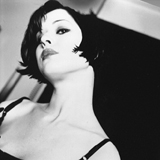 Their input also imbues the album with a distinctly sexual air. Tracks like BREATH CONTROL - for which Blackman even resorted to running around the studio to get the necessary breathy sound - and CHROME have a very sensual feel. "I think that's mainly subconscious, although I do think it's important that the music has a sensual quality, a warmth and humanity," Wilder reckons. "That's one of the reasons RECOIL sounds less electronic than it used to be. That humanity has to be in there. It's very important that it grooves, that it has a muscular quality."
Their input also imbues the album with a distinctly sexual air. Tracks like BREATH CONTROL - for which Blackman even resorted to running around the studio to get the necessary breathy sound - and CHROME have a very sensual feel. "I think that's mainly subconscious, although I do think it's important that the music has a sensual quality, a warmth and humanity," Wilder reckons. "That's one of the reasons RECOIL sounds less electronic than it used to be. That humanity has to be in there. It's very important that it grooves, that it has a muscular quality."
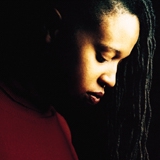 Complementing the black urban sound of Coerbell's input, SUPREME and LAST CALL FOR LIQUID COURAGE display a strong hip hop flavour. Alan believes there's a strong hip hop vibe within much of RECOIL's material, right back to the first few releases and even VIOLATOR and SONGS OF FAITH AND DEVOTION, the last two albums he made with DEPECHE MODE. "You can hear that chopping up; regurgitating the bits to make something post-modern. SUPREME especially suited it, because the lyrics are a social commentary and so it's very near to rap."
Complementing the black urban sound of Coerbell's input, SUPREME and LAST CALL FOR LIQUID COURAGE display a strong hip hop flavour. Alan believes there's a strong hip hop vibe within much of RECOIL's material, right back to the first few releases and even VIOLATOR and SONGS OF FAITH AND DEVOTION, the last two albums he made with DEPECHE MODE. "You can hear that chopping up; regurgitating the bits to make something post-modern. SUPREME especially suited it, because the lyrics are a social commentary and so it's very near to rap."
And then there's BLACK BOX, a two-parter that bookends the other tracks in LIQUID with a vocal that literally stares death in the face. It's based on a real plane crash witnessed by Alan. "People imagine seeing the crash was very disturbing in some way, but that wasn't the case. Something like that does stay with you so I wanted to use it in some way. Using a personal experience is quite different for me, but it's not as if this is an exorcism. The aim is to put you in that surreal moment, with the plane crashing on such a lovely summer day, the birds singing and the smell of the fuel in the air." The narrative represents the thoughts going through the pilot's mind in those last moments. "It became a way to make sense of everything. It was originally just one track, but we split it in two, to create the impression that the other tracks in between might represent his life."
Re: the future of RECOIL
As for where RECOIL will head next Alan isn't certain. "I wouldn't be averse to using any of these people again," he begins. "Working with each one was a good experience. But on the other hand I like the idea that RECOIL changes and mutates. I do have people in the back of my mind but I know that when I start again it will completely change. I could end up making instrumental music again, or working with very different kinds of singers."
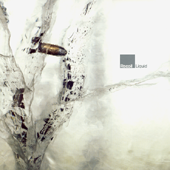 What does want to retain though, is the sense that RECOIL's music has a human element, a warmth not found in some electronic music. "It's difficult to get lots of emotion when you use heavily programmed music. If you haven't got some performance element in the music trying to create that emotive quality is almost impossible. I do really like electronic music, including music that isn't designed to be emotional. But for me it's not enough to do that. That's why RECOIL has developed to be based more around vocals. I don't want to do things that would be background or ambient music. I want the music to be focused, and to have something to say."
What does want to retain though, is the sense that RECOIL's music has a human element, a warmth not found in some electronic music. "It's difficult to get lots of emotion when you use heavily programmed music. If you haven't got some performance element in the music trying to create that emotive quality is almost impossible. I do really like electronic music, including music that isn't designed to be emotional. But for me it's not enough to do that. That's why RECOIL has developed to be based more around vocals. I don't want to do things that would be background or ambient music. I want the music to be focused, and to have something to say."
As LIQUID ably demonstrates, with RECOIL Alan Wilder has at last found a voice.
Bloodline
RECOIL began life as a side project in 1986, with '1+2' released alongside DEPECHE MODE's BLACK CELEBRATION. It wasn't until June 1995 that the project became Alan Wilder's main focus, when he sensationally quit DEPECHE MODE following the SONGS OF FAITH AND DEVOTION tour.
"Being in a gang didn't suit me anymore," explains Alan. "At 35 the mentality of a group didn't feel right. Also the band means being insular and working in a democracy where everyone is forced to compromise. I simply didn't feel there was any more I could achieve in a pop format, with that group of people. Now I have so much more scope."
But to switch from being a member in one of the world's most popular bands to a solo artist must be strange. Doesn't he miss anything from the days in DEPECHE MODE? "I look back on it with fond memories, but not really," Wilder reckons. "If I do miss anything it would be the moments when you're out on the road, having a laugh, at a party or something. But on a general level I don't miss it at all."
World Wilder Web
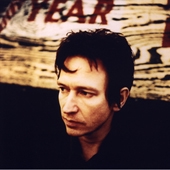 In contrast to the days of DEPECHE MODE, RECOIL is very much a personal project for Alan Wilder, right down to the use of the internet to accompany the record releases. "Mainstream media is narrowing the bandwidth for content more and more, making it very difficult for music," begins Wilder. "That's why I think it's important to use the internet, which is completely open to choice. It's very important for RECOIL, and also for other non-mainstream acts, to cultivate the cottage-industry, mail-order approach."
In contrast to the days of DEPECHE MODE, RECOIL is very much a personal project for Alan Wilder, right down to the use of the internet to accompany the record releases. "Mainstream media is narrowing the bandwidth for content more and more, making it very difficult for music," begins Wilder. "That's why I think it's important to use the internet, which is completely open to choice. It's very important for RECOIL, and also for other non-mainstream acts, to cultivate the cottage-industry, mail-order approach."
He has a very hands-on approach to his Web site, writing a lot of the content and getting involved in programming the pages. "RECOIL is not something I can take out on the road very easily, so in some ways it's my replacement for touring. It's a way for me to communicate, perform and talk to fans, which makes them feel a part of things. We did a survey recently on the site, and the interactive parts, such as the forum, are easily the most popular. People aren't impressed by clever graphics if there's no communication."
Already the site offers downloadable MP3 clips of RECOIL tracks. But will Web-based music transactions really take hold? "It's an inevitability," Wilder responds. "The industry has to accept it. Having said that I don't actually like the sound of the MP3 formatted tracks, I don't like the compression. And personally I'm nostalgic about vinyl and CDs. People like something to hold, something tactile. So it will be a shame if music becomes purely downloadable."